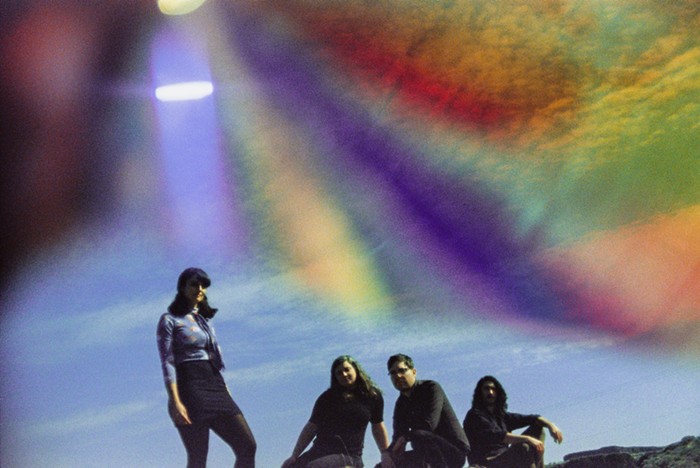The new record, The Grand Archives, sounds a lot fuller, and even faster, than the EP did—even the songs that were on the EP that are now on the record. Was that a conscious decision?
Yeah. We didn't just want to rerecord the songs that were on the EP verbatim. Obviously, "George Kaminski" we changed the entire song. "Torn Blue Foam Couch" we changed the intro a little and sped it up.
Were you worried you were going to push the changes too far?
Other people were [laughs]. [The changes] were a combination of us wanting to do songs a little different and a rule we had when making the record that if you were on, say, your 30th or 40th take on a certain part of a song and you were getting frustrated—if it wasn't fun—then we'd stop doing it and rewrite the part altogether. Like on "George Kaminski," we actually did record a full-band version, like the demo version, and we were up in the cabin singing it and it wasn't working. So we just trashed the whole thing. I sat with one mic and a guitar and played it three or four times—it literally took an hour to record that song. Then the guys [Jeff Montano, bass; Curtis Hall, drums; Ron Lewis, guitar/keys; Thomas Wright, guitar] came in and sang along to it. I played a little steel guitar, Thomas played a little xylophone, and it was fun.
So you go from your EP to your first show to signing with Sub Pop to a tour with Modest Mouse in, what, a year? How did you keep from losing your shit doing all that?
What do you mean by losing your shit [laughs]?
Well, it's all happening very quickly...
Yeah, but I didn't have much time off between Band of Horses and Grand Archives, just like there wasn't too much time between Carissa's Wierd and Band of Horses. It just felt natural getting back on the road and playing shows. Granted, it wasn't the best feeling in the world not knowing how to play the songs and playing them before 3,000 Modest Mouse fans, but are you going to say, "No, we don't want to go on tour with Modest Mouse?" No. You get out there and be ready, whether or not you really like it.
Right now you're very much the focus of attention in the band...
That's unfortunate.
How are you guys dealing with that?
We were talking about this at the practice space the other night, and how the initial goal with this, and it still is, was no frontman. Ron wrote a few songs on the record, I wrote a few songs on the record, we collectively... It's a band. Everybody sings. No one's working any less than the other person. But, unfortunately, since I was in Carissa's Wierd and Band of Horses, I have to do all the interviews. For the next record, I don't want to do any interviews; they can do them all.
You recorded the vocals at a cabin out in Index. Why get out of the city?
When you're singing the four-part vocal harmonies, it's important that everybody's on the same fucking page. Like, one guy's not blown out from drinking tequila shots until five in the morning. We've all got about the same hangover. We wake up around the same time, go to sleep around the same time. No one is showing up at the studio after getting done bartending for a day, pissed because of their customers or because their tips sucked, and then singing crappy. We were up in the mountains, lived in a little shack on the premises. We had a barbecue and grilled out every night, took a BB gun and shot at cans and shit....
The song "Louis Riel" has a sort of stroll-through-the- countryside, happy feeling to it, but there's something menacing going on there.
Yeah, it's a la-la-la song about a guy who was hanged. It's a dark story.
"George Kaminski" is, too. It's a bleak subject when you get down to it.
If you think about it, it goes both ways. When I read about him I thought it was inspiring. This guy's incarcerated for 25 years, but turns it around and gets the world record for four-leaf clovers. And he found them all in one prison yard. One thing that didn't make it into the song was he'd already been in prison for something like five or six years, and there was a kid who came in, like an 18-year-old, real bummed about being in prison. And Kaminski was like, "You've got to look for the good things." And he stumbled across a four-leaf clover and showed it to the kid and said, "Look, a four-leaf clover in a prison yard." And the kid's kinda like, "Yeah, okay, you're right." And the next thing you know, Kaminski's in the Guinness Book of World Records. That's the hope. That's the happiness in this. There's a bright side.
But then he lost the record.
Right. There's a line [in the song]: "You've got the whole world, I've got these four leaves and walls." So yeah, it's a song that starts out in tragedy, builds up to hope, and then it ends in tragedy, when this fucker in Alaska beats him. ![]()



















